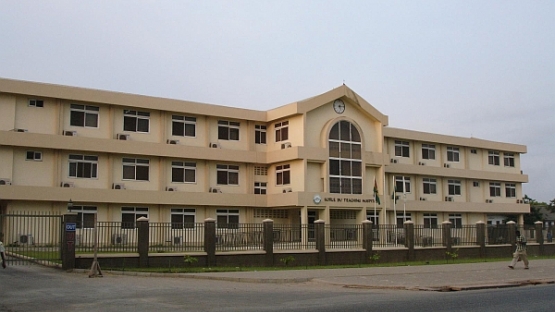In September 2005, the IAEA, under technical cooperation project GHA/6/012, assisted a national team from Ghana to develop a "bankable" project document on expanding the national radiotherapy and nuclear medicine services. The project entailed consolidating radiotherapy and nuclear medicine services at Korle Bu Teaching Hospital (KBTH), Accra; consolidating radiotherapy and establishing a nuclear medicine facility at the Komfo Anokye Teaching Hospital (KATH) in Kumasi; and establishing a radiotherapy and nuclear medicine facility at Tamale.
The 58th World Health Assembly recognized the need for a comprehensive and integrated approach to fighting cancer. Its May 2005 resolution on cancer prevention and control gave recognition to the work of the IAEA and welcomed the Programme of Action for Cancer Therapy (PACT), which was created by the IAEA in 2004. PACT is assisting a number of developing countries such as Ghana to introduce, expand and improve their cancer care capacity and services in a sustainable manner by integrating radiotherapy into comprehensive national cancer control programmes that maximise therapeutic effectiveness and impact. Based on WHO guidelines, these programmes integrate and align investments and activities in cancer prevention, surveillance, early detection, treatment and palliative care.
In November 2005, an "Integrated mission of PACT" (imPACT), involving IAEA and WHO personnel, was carried out to assess each component of national cancer control in Ghana. This imPACT mission resulted in a proposal submitted to the Government of Ghana entitled, "Building Comprehensive Cancer Control Capabilities in Ghana". The document addressed all aspects of a National Cancer Control Programme, including prevention and early detection, expansion of nuclear medicine and radiotherapy and palliative care. The overall project required funding of $22.5 million.
Using the above documents, the Government of Ghana, with support from the IAEA, managed to secure loans from the OPEC Fund for International Development (OFID) and the Arab Bank for Economic Development in Africa (BADEA). Together with its own contribution, the funds available to the Government of Ghana amount to approximately $13.6 million. These funds have been earmarked for the KBTH and KATH facilities as well as aspects related to cancer registration, prevention, early detection and palliative care. The Government, with continued support from the IAEA, will endeavour to secure the remaining funds required to implement the entire project, which includes further aspects related to registration, prevention and early detection, curative and palliative treatment in the country. This also includes the establishment of a new radiotherapy and nuclear medicine centre at Tamale.
The radiotherapy and nuclear medicine aspects of the project are being supported by the IAEA under Technical Cooperation Project GHA/6/015 Upgrading and expansion of radiotherapy and nuclear medicine services, which is being extended to the 2009-2011 cycle. Limited support, mainly in the area of provision of expert services, will also be available under IAEA-supported regional AFRA projects.
A meeting was convened in Vienna, from 17 to 19 November 2008, to review the status of the radiotherapy and nuclear medicine facilities at Accra and Kumasi; update the national workplan for cancer prevention and early detection activities; and update the workplans for the expansion of the radiotherapy and nuclear medicine facilities at Accra and Kumasi. The meeting brought together major roleplayers who will be involved in implementing the programme.
The Ghana team attending the meeting was made up of senior managers from the KBTH and KATH facilities as well as a representative of the Ministry of Health who will be overseeing the implementation of the project in Ghana. The IAEA was represented by personnel from the Programme of Action for Cancer Therapy (PACT) Office; the Division for Africa, Department of Technical Cooperation; and the Division for Human Health, Department of Nuclear Sciences and Applications. The WHO was represented by delegates from the Division of Prevention and Control of Non-Communicable Diseases, WHO Regional Office for Africa; and the WHO country office in Ghana. The Breast Health Global Initiative was also represented.
The Government of Ghana is currently finalizing the details of the loans with OFID and BADEA. This is expected to be completed within the next weeks. In September 2008, the Minister of Health established a Steering Committee to advise the Government on all aspects related to cancer in Ghana; oversee the establishment and operation of a National Cancer Control Programme; and develop policy guidelines on the implementation of the National Cancer Control Programme.
The WHO regional and national offices are expected to be closely involved in supporting the effort of the Government to fully establish a National Cancer Control Programme for Ghana.
The Ministry of Health will oversee the utilization of the loans through a local project implementation office.
The Government will request the IAEA to assist with the procurement process by providing advice on specifications of instruments and assistance in evaluating bids.
Continued IAEA assistance will be provided through project GHA/6/015 and regional AFRA projects to support expert services and training of key personnel. PACT will assist as appropriate in coordination with the National Cancer Control Programme Steering Committee. PACT will continue to advise the Government, assist in fostering alliances with international organizations, and support the securing of additional funds through its network of partnerships.
The WHO reaffirmed its technical support to Ghana and will continue mobilizing communities in the fight against cancer and facilitating effective linkage, cooperation, collaboration and coordination among partners and stakeholders; carrying out advocacy and providing technical and material support for establishment/strengthening of the National Cancer Control Programme.


